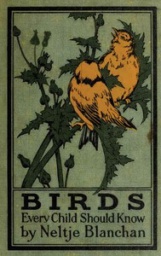

Birds Every Child Should Know (1907)
by Neltje Blanchan


How delightfully he and his busy friends, who are always within call, punctuate the snow-muffled, mid-winter silence with their ringing calls of good cheer! The orchards where chickadees, titmice, nuthatches, and kinglets have dined all winter, will contain few worm-eaten apples next season. Here is a puzzle for your arithmetic class: If one chickadee eats four hundred and forty-four eggs of the apple tree moth on Monday, three hundred and thirty-three eggs of the canker worm on Tuesday, and seven hundred and seventy-seven miscellaneous grubs, larvae, and insect eggs on Wednesday and Thursday, how long will it take a flock of twenty-two chickadees to rid an orchard of every-unspeakable pest? One very wise and thrifty fruit grower I know attracts to his trees all the winter birds from far and near, by keeping on several shelves nailed up in his orchard, bits of suet, cheap raisins, raw peanuts chopped fine, cracked hickory nuts and rinds of pork. The free lunch counters are freely patronised. There is scarcely an hour in the day, no matter how cold, when some hungry feathered neighbour may not be seen helping himself to the heating, fattening food he needs to keep his blood warm. At the approach of warm weather, chickadees retreat from public gaze to become temporary recluses in damp, deep woods or woodland swamps where insects are most plentiful. For a few months they give up their friendly flocking ways and live in pairs. Long journeys they do not undertake from the North when it is time to nest; but Southern birds move northward in the spring. Happily the chickadee may find a woodpecker's vacant hole in some hollow tree; worse luck if a new excavation must be made in a decayed birch -- the favourite nursery. Wool from the sheep pasture, felt from fern fronds, bits of bark, moss, hair, and the fur of "little beasts of field and wood" -- anything soft that may be picked up goes to line the hollow cradle in the tree-trunk. How the crowded chickadee babies must swelter in their bed of fur and feathers tucked inside a close, stuffy hole! Is it not strange that such hardy parents should coddle their children so?🏁
Global Leaderboard
| # | Player | Time | Duration | Accuracy | WPM | pp | ||
|---|---|---|---|---|---|---|---|---|
| 1 | ||||||||
| 2 | ||||||||
| 3 | ||||||||
| 4 | ||||||||
| 5 | ||||||||
| 6 | ||||||||
| 7 | ||||||||
| 8 | ||||||||
| 9 | ||||||||
| 10 |


How delightfully he and his busy friends, who are always within call, punctuate the snow-muffled, mid-winter silence with their ringing calls of good cheer! The orchards where chickadees, titmice, nuthatches, and kinglets have dined all winter, will contain few worm-eaten apples next season. Here is a puzzle for your arithmetic class: If one chickadee eats four hundred and forty-four eggs of the apple tree moth on Monday, three hundred and thirty-three eggs of the canker worm on Tuesday, and seven hundred and seventy-seven miscellaneous grubs, larvae, and insect eggs on Wednesday and Thursday, how long will it take a flock of twenty-two chickadees to rid an orchard of every-unspeakable pest? One very wise and thrifty fruit grower I know attracts to his trees all the winter birds from far and near, by keeping on several shelves nailed up in his orchard, bits of suet, cheap raisins, raw peanuts chopped fine, cracked hickory nuts and rinds of pork. The free lunch counters are freely patronised. There is scarcely an hour in the day, no matter how cold, when some hungry feathered neighbour may not be seen helping himself to the heating, fattening food he needs to keep his blood warm. At the approach of warm weather, chickadees retreat from public gaze to become temporary recluses in damp, deep woods or woodland swamps where insects are most plentiful. For a few months they give up their friendly flocking ways and live in pairs. Long journeys they do not undertake from the North when it is time to nest; but Southern birds move northward in the spring. Happily the chickadee may find a woodpecker's vacant hole in some hollow tree; worse luck if a new excavation must be made in a decayed birch -- the favourite nursery. Wool from the sheep pasture, felt from fern fronds, bits of bark, moss, hair, and the fur of "little beasts of field and wood" -- anything soft that may be picked up goes to line the hollow cradle in the tree-trunk. How the crowded chickadee babies must swelter in their bed of fur and feathers tucked inside a close, stuffy hole! Is it not strange that such hardy parents should coddle their children so?🏁
